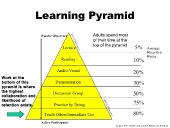Paul's
threads on the PEP and our discussion of the value of teaching as part of the learning process, and DLogan's thread on
PDCs got me thinking about teaching of permaculture topics. I just finished another round of teaching photography to adult learners. It took me several iterations of teaching this course to find my way through everything I need to cover in the allotted 6 hours. The hardest part is the first 90 minutes, in which I (incredibly to some other teachers) go through the concept of exposure from fully automatic to manual control. By the end, they all can do it...but it can be rough for some along the way. Why?
When I started this gig, I was taught that
people have preferences for how they learn. There are loads of theories on
learning styles. I can break down what I see to a few main types on how they prefer to intake and process information:
-
aural (biggest percentage, probably self-selected by the fact they are paying for classroom learning. Reading the manual is their last resort, the most social learners. I seat the class by camera brand on purpose so they can help each other)
-
visual (readers, often arrive frustrated by the poorly written manuals they've tried to read on their own, furtively reading my handouts while I lecture. I spend a lot of time contextualizing and debunking the internet for them)
-
kinesthetic (they understand it only when they see the settings change by their own hands, they often aren't listening to me half way through my explanation because they are experimenting with their cameras now that they have an idea of what button to twiddle. Ask questions out of their observations to build up their own general understanding)
-
theoreticians (one group that doesn't really fit. They could be any of the three in intake preferences. These folks must understand theory before they will touch their cameras, they are surprised, almost resistant when I tell them to pick it up in the first minutes of class. They love it when I go into the underlying mathematics that frighten some of the others.)
None of these people or styles are wrong. Expecting everyone to learn like me is the Type 1 error. Now managing all of these different kinds of learners at one time gets chaotic. We limit the class to 10 for that reason so I can spend time with the social and kinesthetic learners. Early on, I needed to add more structure for the the theoretical learners. And I always seem to find myself pleading with someone in the group: don't fret about it, just mull it in your mind. I promise lightning will strike and illuminate it for you, I just can't predict when. Hang with me until then. After it does, you won't be able to remember not understanding. The head chatter of fretting (more common in women, I don't know why. Or maybe they are just more vocal about self-doubt that they will ever understand.) is counterproductive, just mull it over. Some of them need to take a break and come back to it after we do a few other modules. Lightning always does seem to strike for them by the end of class.
Now
retention is a different thing. I can tell you how, explain why, draw it for you, show you where to read it, demonstrate it for you, but until you do it with your own hands, you won't really remember how to set your shutter speed. There are some that want me to do it for them. I hand them their cameras back, saying as nicely as I can, "I don't need to know how to work your camera, you do."
Being aware of these preferences has made me a better teacher. I know I need to offer up the information in 4 different ways to meet all their needs, and that's ok. Some students who "get it" one way aren't always patient with their classmates who need a different approach, but I have to be there for everyone in parallel. Loads of praise all around works wonders.
So that's my story. Not having finished my PDC yet, I am wondering how my experience compares to those who teach PDCs and other topics, especially to adults. How do you accommodate the various types in your classes?
How you go about learning new things yourself (I'd much rather read it first than watch Youtube videos, for example)? Do you have a spouse or child that learns in a different mode than you? Has your style changed over the years?


 3
3




 1
1




 2
2




 2
2











 1
1




 1
1








 1
1

















